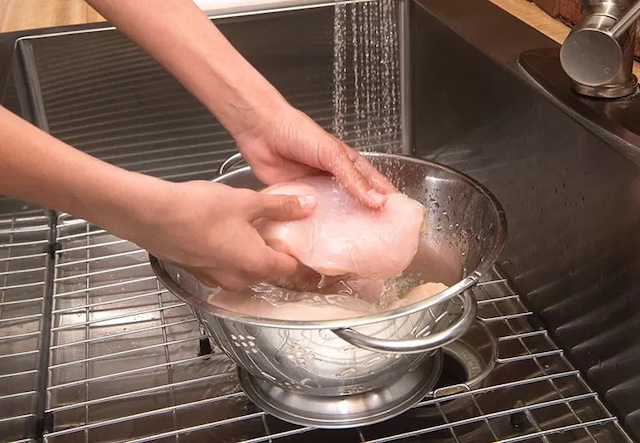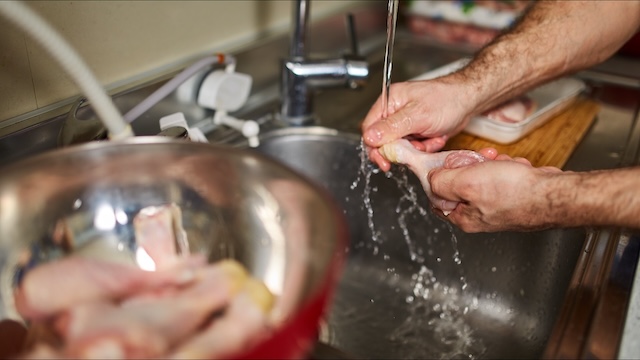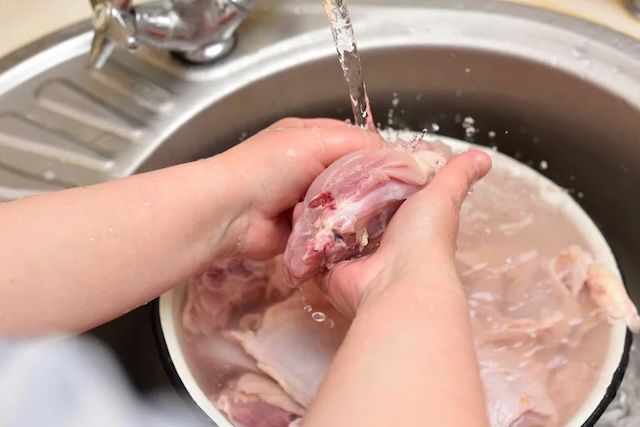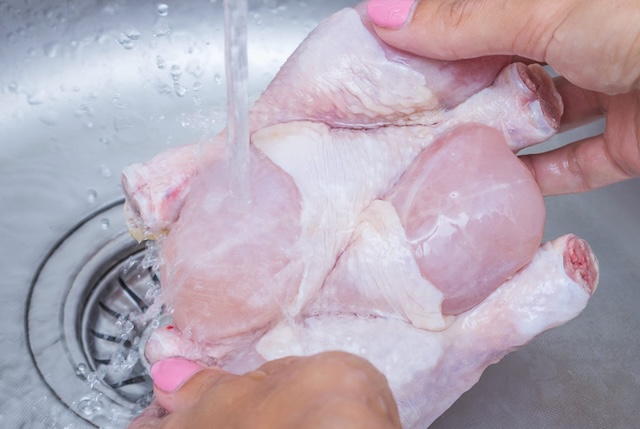The seemingly simple act of rinsing raw chicken has divided many households. In the viral image above, a person reveals an argument with their sister-in-law about rinsing chicken in the sink before cooking. Is it a safe practice, or does it actually lead to health hazards? This article explores both sides of this debate to determine whether rinsing chicken is a helpful step or a dangerous misconception.
Why People Rinse Chicken Before Cooking
Many people still rinse raw chicken before cooking. The reason behind this practice is often tied to tradition or a belief in removing contaminants from the surface of the chicken. Some people believe that rinsing helps remove bacteria, blood, or any residue left on the chicken, giving them peace of mind before cooking.
For many, this habit has been passed down from parents or grandparents, who taught that rinsing chicken is a necessary step to ensure cleanliness. However, recent debates and expert opinions have called into question whether rinsing chicken is effective or, instead, harmful.

Arguments Against Rinsing Chicken
While many people continue to rinse chicken out of habit or tradition, health experts have raised significant concerns about this practice. The primary arguments against rinsing chicken center on the risk of cross-contamination and the fact that rinsing does not actually remove harmful bacteria.
Cross-Contamination Risks
One of the biggest dangers of rinsing chicken is cross-contamination. When raw chicken is rinsed under running water, bacteria like Salmonella or Campylobacter can spread to nearby surfaces, utensils, and even other food. Water droplets from rinsing can splash up to a meter away from the sink, carrying bacteria to countertops, cutting boards, and other kitchen tools. This can significantly increase the risk of foodborne illnesses.
Cross-contamination is especially dangerous because many people are unaware of how far these bacteria can travel. Despite cleaning the sink afterward, the droplets that land on other surfaces can easily go unnoticed, leading to unintentional contamination.
Expert Warnings
Food safety authorities, including the Centers for Disease Control and Prevention (CDC) and the United States Department of Agriculture (USDA), strongly advise against rinsing raw chicken. According to these experts, cooking chicken to an internal temperature of 165°F (74°C) is sufficient to kill any harmful bacteria present. Rinsing the chicken beforehand does nothing to reduce bacterial load and only serves to increase the risk of contamination in the kitchen.
These experts emphasize that the key to food safety lies in proper cooking and handling rather than washing raw poultry. They recommend avoiding rinsing altogether and instead focusing on thoroughly washing hands, cleaning surfaces, and ensuring the chicken is fully cooked.

Arguments for Rinsing Chicken
Despite the warnings from health authorities, there are still some who believe that rinsing chicken is necessary. Their arguments often revolve around personal preferences, tradition, and the desire to remove any unwanted residue.
Tradition and Beliefs
Many people have grown up in households where rinsing chicken was a standard practice. For them, it is an essential step in food preparation that is ingrained in their cooking routine. It’s not uncommon for this habit to be passed down through generations, creating a sense of security and cleanliness associated with rinsing.
There’s also a cultural aspect to the practice of rinsing chicken. In some cultures, washing meat, including chicken, is part of a broader ritual of ensuring purity and cleanliness. Breaking away from these traditions can be difficult, especially when it has been a fundamental part of cooking for so long.
Removing Slime or Residue
Another reason why people rinse chicken is to remove any slimy film or residue that may be present on the surface. The appearance of raw chicken, which can sometimes be slimy, can make some people uncomfortable. Rinsing the chicken makes them feel better about handling and cooking it, as it appears cleaner to them.
For those who are sensitive to the appearance or texture of raw meat, rinsing offers a way to alleviate those concerns, even if the experts argue that it doesn’t impact the safety of the final dish.

What the Experts Say
When it comes to the question of whether you should rinse chicken, the experts are quite clear: you should not. The CDC, USDA, and other food safety organizations all recommend against rinsing raw chicken due to the risk of cross-contamination. According to these experts, cooking chicken to the proper internal temperature is the only way to ensure that any harmful bacteria are killed.
Food safety professionals also stress the importance of good kitchen hygiene. Washing your hands thoroughly before and after handling raw chicken, using separate cutting boards for raw meat and other foods, and cleaning surfaces properly can all help minimize the risk of foodborne illnesses without the need for rinsing.
Instead of rinsing chicken, the experts recommend patting it dry with a paper towel if you feel the need to remove any moisture or residue. This method does not create the same risks of cross-contamination, as the bacteria are not spread around the kitchen through splashing water. The used paper towel should then be immediately discarded, and hands should be washed thoroughly.

Conclusion: To Rinse or Not to Rinse?
The debate over rinsing chicken ultimately comes down to a conflict between tradition and food safety. On one side are those who, out of habit or cultural practice, believe that rinsing chicken is an important step in ensuring cleanliness. On the other side are food safety experts who warn of the dangers of cross-contamination and emphasize that proper cooking is all that is needed to make chicken safe to eat.
If you’re someone who has always rinsed chicken because it’s what you were taught, it might be challenging to change this habit. However, understanding the risks involved and the recommendations from food safety authorities can help you make an informed decision. Ultimately, cooking chicken thoroughly is what matters most, and avoiding rinsing can help reduce the risk of spreading harmful bacteria in your kitchen.
The next time you find yourself debating whether to rinse chicken or not, remember that while the intention is to make the chicken cleaner, the science shows that rinsing only adds risk. Instead, focus on proper cooking techniques, maintaining a clean kitchen, and handling raw chicken with care to ensure your meals are both delicious and safe.



